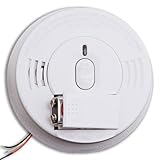When it comes to protecting your home and family, smoke alarms (also sometimes called smoke detectors or fire alarms) are a must. In fact, each year, 1,450 deaths are attributed to missing smoke alarms or those whose batteries aren’t working. So finding the right ones for your family and properly installing and maintaining those detectors is mandatory. Here we’re taking a look at Kidde, one of the largest producers of fire safety devices in the world.
Kidde has been in the business for more than a century and has an excellent reputation. It’s known for producing well-made, reliable equipment that protects families. Kidde’s products include everything from smoke and carbon monoxide alarms to fire extinguishers, escape ladders and home security products, such as safe key storage devices.
Kiddie products don’t always come equipped with the latest and greatest technology, but they’re moderately priced and provide the basic features necessary to keep homes safe. They’re best for those looking for simple, affordable, no-frills protection, rather than those looking for a ton of bells and whistles.
Pros
- Affordable Most of the Kidde detectors are competitively priced. Basic alarms start around $20, and most cost less than $100.
- Reliable Kidde has been in the home safety business for more than a decade, and it has a good reputation for producing products on which you can count.
- Excellent customer service Online reviewers consistently give Kidde high marks for customer service. They’re responsive and swift to address any issues, in our SecurityNerd’s experiences.
Cons
- Limited technology If you like the idea of being alerted to any emergencies on your smartphone or want to connect with other home automation products, these aren’t the best smoke detectors for you. The Kidde models are fairly basic and the technology is limited.
- Complicated installation – A number of Kidde detectors are hard-wired, and the process to install them can be cumbersome.
Popular Kidde Smoke Detector Specs
While Kidde offers a wide range of smoke detectors, here’s a look at some of their most popular models. Note that there are two primary types of smoke alarms—ionization-sensing, which may detect flaming fires sooner and photoelectric-sensing, which may detect smoldering fires sooner. The company recommends having a combination of both types of alarms in homes.
Options from Kidde made it into our top picks for the best smoke alarms
1. Kidde i12040 AC Hardwired Interconnect Smoke Alarm
At just about $20, this smoke alarm won’t break the bank, but it provides the peace of mind you want in your home. It’s hardwired, but has a 9-volt battery backup to keep your family safe even when the power goes out. It can be connected to up to 24 other alarms in your house too so that when one goes off, they all go off.
It’s an ionization-sensing alarm, and it’s equipped with the company’s patented Hush technology, which allows you to essentially turn off the alarm for about 7 minutes when you know what is setting the alarm off, such as burning something in the oven (no need to rip it off the wall and rip the battery out to stop it from sounding!). It’s also designed to be tamper-proof. The P12040 is much the same, but it uses photoelectric-sensing technology.
- Easy Installation - Front battery pull tab allows battery activation without removing alarm from mounting bracket. Large mounting base makes...
- Fewer callbacks - One button design for easy operation and less confusion. Operates Hush and alarm test. Battery run down protection will...
- User-friendly features - Tamper resist locking feature deters alarm theft. Alarm memory flashes red LED indicating which unit was the...
- Interconnectable - Connect up to 24 devices (of which 18 can be initiating) including smoke, CO and heat alarms. See user’s guide for...
- Battery backup - 9v battery backup (included).
2. Kidde i12060 AC Hardwired Smoke Alarm
This alarm is a lot like the i12040 above. It’s also an ionization-sensing model, and it’s hardwired with a 9-volt battery backup. It also comes with the Hush feature, so you can keep things quiet when you know why it’s going off (burnt bacon again?).
One difference—this one has a front-loading battery door, which may make changing the battery easier. It’s also a few dollars more than i1240, usually ringing in around $25, so you pay a bit more for that convenience.
- Front battery pull tab allows battery activation without removing alarm from mounting bracket. Large mounting base makes mounting easier,...
- Interconnectable with up to 24 devices (of which 18 can be initiating including smoke, CO and heat alarms.
- Battery backup provides protection in case of power failure
- UL listed, 10 year warranty
- Front battery door makes replacing the battery easy for anyone.
3. Kidde i4618 Firex Hardwired Smoke Alarm
The i4618 has much in common with the i2040 and i2060. It’s a hardwired model that has a 9-volt battery backup in case you lose power. It uses ionization-sensing technology and features a front-loading battery door for easy battery changes, but this door slides rather than lifting up. Other features include the Hush technology and tamper-resistant locking. The full retail price is about $25, and (like with all the other models) they can often be found for less by shopping around a bit.
- Latching LED, a red LED flashes until reset for quick, clear identification of the initiating smoke alarm in an interconnected system
- Visible low battery indicator, helps locate chirping unit
- Front loading battery door makes battery changing simple and power link tab makes installation faster and easier
- False alarm control quiets unwanted alarms for up to 15 minutes
- Interconnects with other Firex smoke alarms and heat alarms compatible with other contractor preferred Firex products
4. Kidde i9050 Battery Operated Smoke Alarm
Don’t want the hassle of hardwiring a smoke alarm? This model runs on a 9-volt battery, and a flashing light lets you know the battery is working. There’s a test button too, so you can make sure the alarm itself is working properly. This alarm is ionization-sensing, and it can be used in any area. It’s easy to install, and the price is low.
No products found.
5. Kidde C3010 Sealed Lithium Battery Power CO Alarm
This model provides straight-up carbon monoxide detection. It runs on a 10-year sealed lithium battery, so once it’s up and running, you should be good to go for about a decade. A test button lets you make sure it’s working, and the same button immediately silences the alarm should you need to silence it. Because the Kiddie C3010 is battery operated, there’s no need for wiring, which makes installation simple. It can be used in any area of your home, and it usually costs under $50.
- LED Lights - Green for normal operation, Red for alarm, Amber for Error.
- Digital Display - Displays the level of carbon monoxide the unit is sensing. The unit updates this reading every 15 seconds.
- 10-Year Sealed-in Lithium Batteries -Unit will continue to operate for 10 years. Alerts user to replace unit after 10 years of operation.
- Peak Level Memory - Displays the highest CO concentration measured since the last reset.
- Test/Reset -Tests CO alarm circuit operation and allows you to immediately silence the alarm.
6. Kidde P3010CU Worry-Free Combination Smoke and Carbon Monoxide Alarm with Sealed Lithium Battery Power
For smoke and carbon monoxide detection in one unit, there’s this combination alarm. It uses both photoelectric and electrochemical sensing technology, and it features a voice alarm to let you know whether it’s detecting fire or carbon monoxide. It runs on a sealed-in lithium battery that’s designed to run for 10 years. It runs about $60.
- 2 units in 1: unit alerts you to smoke & carbon monoxide by sounding a loud, 85-decibel alarm & sounding voice alerts
- Photoelectric sensor technology senses visible fire particles, while a electrochemical sensor detects CO gas
- Voice Alarm & an 85-decibel alarm announces a hazard when detected: “Fire!” = smoke or fire or “Warning Carbon Monoxide” = CO gas,...
- Operates on a 10-year lithium battery, eliminating the need for battery replacement, while providing reliable detection during a power...
- Combination fire alarm automatically activates when it is attached to the mounting bracket
Bottom Line on Kidde Smoke Detectors
If you’re looking for reliable, affordable smoke and carbon monoxide detectors, it’s worth taking a look at Kidde products. They’re well-made, provide solid protection, and you can rest easier knowing your home and family are better protected. Tech enthusiasts, however, may want to look elsewhere as they don’t integrate with other home automation products, and there’s no app with which you can monitor them.
This article has been reviewed and approved by Officer Banta.

Officer Banta is the official SecurityNerd home security and safety expert. A member of the Biloxi Police Department for over 24 years, Officer Banta reviews all articles before lending his stamp of approval. Click here for more information on Officer Banta and the rest of our team.






